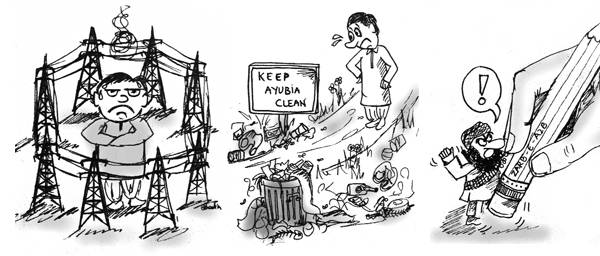
Lost vision
Sir,
Pakistan’s existing policy frameworks contain a number of exceptional goals and objectives, including an improved quality of education, the elimination of all types of disparities imbalances, and significantly improved enrolment rates. However in current policy structure, Pakistan is long away from achieving this vision.
The vision document has positioned human resource development at the top of national agenda by capitalizing on existing social capital, strengthening it and improving the human skill base of the population to optimally contribute to and effectively benefit from economic growth.
But unfortunately, like previous budgets, an analysis of current year federal budget reveals how the wellbeing of citizens has been ignored by allocating more than 18 percent of national budget to defense. Even in today’s world of knowledge based societies our allocation for health and education are shamefully lowest in the region.
According to federal budget document 2014-15, the education and health sectors have once again failed to receive their due share in the present budget. An amount of Rs 74.031 billion has been allocated to both sectors registering an increase of only 1.5 percent as compared to the previous year which pales into insignificance if population growth and inflation hovering around 9 percent are adjusted.
Of total amount of Rs 74 billion, a paltry sum earmarked for education, only 13.5 percent goes to the health sector indicating the authorities’ myopic vision of reforming health sector.
In addition to this, the financial bill for the year 2014-15 has once again shattered hopes and dreams of the poor. This bill consists of ambitious development schemes such as metro buses services, metro trains, and motorway from Karachi to Lahore. The dilemma of the government is the result of poor planning, inaccurate distribution of funds, for instance, the building of metro buses rather than hospitals and schools.
In the PSDP for 2014-15 major investment is envisaged in energy sector, followed by transport and communications. Out of total 1175 billion, only 12.5 billion have allocated for achievement of Millennium Development Goals (MGDs).
While on the other hand, under pillar one of Vision 2025 government promises that a larger share of the GDP, at least 4pc to education and at least 3pc to health, would have to be allotted to achieve universal primary education with 100pc net primary enrolment, increase higher education coverage from 7pc to 12pc and increase proportion of population with access to improved sanitation from 38pc to 90pc.
Looking into all these facts, the current resource allocations by government do not shows any political will to priorities human development to achieve the goals and objectives of Vision 2025. In its current shape Pakistan is the embodiment of a security state where human development barely attracts attention.
On the whole, the budget is far from ‘poor-friendly’ and presents claims completely divorced from reality. The myth of macro-stabilization and its consequent trickle-down affects has shattered and the lot of the poor has not changed. The misplaced priorities coupled with shotgun approach to allocations will worsen the economic crisis confronting the country in coming years.
At this critical juncture Government of Pakistan needs to stabilize the economy, rebuild severally eroded credibility, close the fiscal deficit, re-establish confidence in public institutions and improve the investment climate. In parallel with its macroeconomic stabilization program the government needs to develop a comprehensive program of structural reforms as a part of vision 2025.
Pakistan must respond to such challenges effectively, since all nations now aspire to become knowledge economies. This calls for change in mindset incorporating a quest for excellence, so that Pakistan can redefine and transform its institutions and structures of the state, as well as national policies, strategic priorities and long term bench marks within the overarching for Pakistan in 2025.
Haider Abbas,
Islamabad.
What ails Taliban
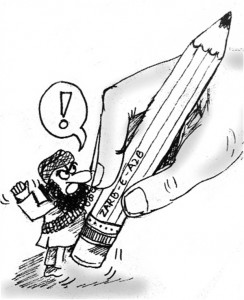
Sir,
I am pretty amazed with the statements given by the Taliban leader Shahidullah Shahid about the recent wave of attacks by Pakistan Army and air force. Those who have killed thousands of innocent people and talk of burning down Islamabad and Lahore are now blaming the government for the failure of peace talks.
The offensive launched against these local militants and foreign fighters was highly anticipated, and finally, the armed forces launched the offensive unilaterally. A mandate from the government was announced only after the operation started. But the Taliban point the finger towards the federal and Punjab governments and claim they did not want the talks to succeed.
Everyone in Pakistan knows that Prime Minister Nawaz Sharif took several measures to keep the army out of North Waziristan and keep a lid on any operations in that area.
Perhaps that is exactly why the Taliban spokesman holds him responsible for the killing of his comrades in Operation Zarb-e-Azab.
Ammar Bajwa,
Ontario.
Crime against nature
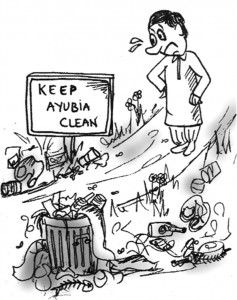
Sir,
I have recently visited Ayubia. I was indeed happy to read signs for all the visitors to take care of nature, keep the pathways clean, protect wild life, and not smoke or light fire along the tracks. Whenever I read such a sign, I was double motivated to do so as the place is beautiful and I should be one of those to add to the beauty of the place.
However, I do wish to make everyone aware of what the locals are doing. In most of the natural drains where the rainwater drains down the hills, there is lots of litter thrown about. On one of the tracks that leads to a church of more than a hundred years old, so much litter has been thrown that it creates a very unhealthy atmosphere, and many visitors are discouraged to continue their hike to the beautiful church. On one part of the track, the soil has eroded and trees have fallen. Why did this occur? As we look above, there is a lot of plastic rubbish, disposable cutlery and other such things that block the rainwater from flowing and also preventing some of it from being absorbed by the soil. Absorption of rainwater is required to keep the soil and trees strong.
I request the authorities to take action against those who are doing this crime against nature and spoiling their own beautiful resort, and get them to clean up all their dirt they have strewn about and restore the track that leads to the Church.
The church too needs renovation and restoration.
Abid Habib,
Mirpurkhas.
Poppy-free state

Sir,
There was a time in the 1980s when Pakistan was deeply involved in the processing of opium, and many influential people in the country were involved in its smuggling. But that is no longer the case. The total area under poppy cultivation in Pakistan was 6,694 hectares which is reduced to 493 hectors by ANF – far less than 1000 hectors, which is the United Nations’ criteria of declaring a country a Poppy-Free State. There are about four million drug addicts in Pakistan, of which 500,000 are said to be chronic heroin users and 60,000 to 100,000 intravenous drug users.
With very little force and monetary resources, Pakistan’s performance in comparison with other countries is outstanding and laudable. The government and international institutions must not only appreciate the courageous performance of ANF but to do more in terms of funds and human resource to help it further fight the menace of narcotics.
Qaiser Shah,
Haripur.
Misconceptions
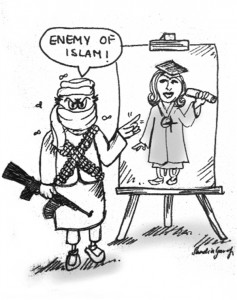
Sir!
This refers to the article “The idea of Hijab” by M Aamer Sarfraz (TFT June 13-19, 2014). Mr Sarfraz’s in-depth research on a very sensitive subject is worth appreciating and valuing. In a very befitting manner, he has tried to clear the (mis)conception regarding the Hijab prevailing in our society in its existing form.
“I believe there is much more to Islam than Halal, Hijab and Polygamy,” he correctly states. It is tragic and very unfortunate that we have confined our great religion Islam within certain boundaries, some of which have been highlighted by Mr Sarfraz, while sidelining the basic teaching that is of humanity, equality, tolerance, justice, charity and people’s rights.
The importance Islam gives to education is well known, but we hardly find any Muslim country with a university of repute. On the contrary, we see how our self-claimed Muslim scholars discourage education, especially for the women, and the Taliban and Boko Haram are living examples of this mind set. The victim of their biased and discriminatory thinking, Mala Yousufzai, is known the world over.
Aamir Aqil,
Lahore.
Fine line
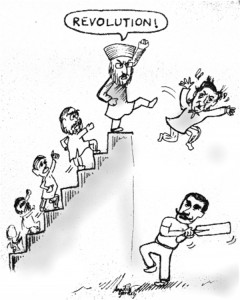
Sir,
Take a hypothetical situation: the powers that brought in Dr Qadri succeed in destabilizing the utterly incompetent and inept, but democratically elected and legal, government of the day. The “revolution” is successful and Dr Qadri is installed as the face. After a while when rhetoric alone is inadequate or the need for him subsides, say yet another sleeper emerges from the Western woodwork promising a greater and better “revolution!”
Move to an improved hypothetical situation: Messrs Zardari and Nawaz re-handshake on the ‘Charter of Democracy’ and lead a similar, populist and just as destabilizing, joint return to ensure that “democracy is the best revenge!” Emirates, now once well bitten, may not allow them to stage the same grand disruptive entrance and the establishment is likely to be not amused. But will anything else really be different from what we saw over the past few days? Will the Gullu Butts be any better?
We are making a laughing stock of ourselves trying Pervez Musharraf for High Treason when the man’s real fault is that he fast became a politician and did not do what he said he came to do. He failed as Attapak! Now here is a man, a foreigner to boot, who openly and most embarrassingly claims allegiance only to the Armed Forces, technically a subservient arm of a legal Parliamentary government, and possibly to other controlling elements. To quote an apt news analysis, “…while (Qadri) wants to bring ‘revolution’ on the force of street power, without the due electoral process; selectively accepts and rejects the Constitution of Pakistan; aspires to fuel confrontation; and is not inclined to contest general elections...”(Opponents of Sharif brothers go for Punjab, by Tariq Butt. The News, 23rd June).
Could someone please explain the difference between a patriot and a subversive?
Dr Mervyn Hosein,
Karachi.
People and power
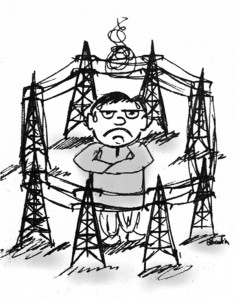
Sir,
The Ministry of Water and Power announced on 29th June that the government will increase the subsidy on electricity so that people do not suffer because of load shedding in Ramzan.
The root cause of electricity shortage in the country is the privatization of electricity generation and distribution. This privatization means that private owners, who have limited resources, only provide electricity when they can profit. The severe power shortage occurs because the private owners cannot provide electricity as a service and a right for all citizens, for that is the job of a responsible and caring state. So, private owners reduce electricity generation to prevent falling into loss through debts owed to them. Or they reduce generation to only the more efficient power plants because they give a better profit, keeping less efficient power plants idle.
So, even though Pakistan has over 20,000 MW installed capacity against a peak demand of 17,500 MW, less than half of that is produced, causing huge electricity shortages, twelve hours a day or even more, making the lives of citizens miserable in summers, and destroying local industry.
Moreover, as part of privatization, the regime has already guaranteed profits on investment for private owners of power, by increasing the electricity charges manifold. It has also made sure that the private owners are paid from the revenues of the state, even when they are not generating electricity because of fuel shortages! Electricity has become so expensive that there is now a huge circular debt owed to the private owners of power. Last summer, in July 2013, the regime paid Rs 270 billion to the private power producers, the IPPs. This enormous amount also shows just how much wealth there is in power, which they will not see a single rupee of. And this year, the debt has mounted yet again.
The argument that government is a poor manager and cannot run corporations profitably is a flawed one. Electricity provision is a public service and not a business. And the incompetence of the government is no argument for outsourcing a public service to private businesses.
Moez Mobeen,
Islamabad.
Correction
Some of the images on pp 16-19, TFT July 4, illustrating the article “Khalid Iqbal’s many seasons”, were courtesy Zarah David – Ed.

